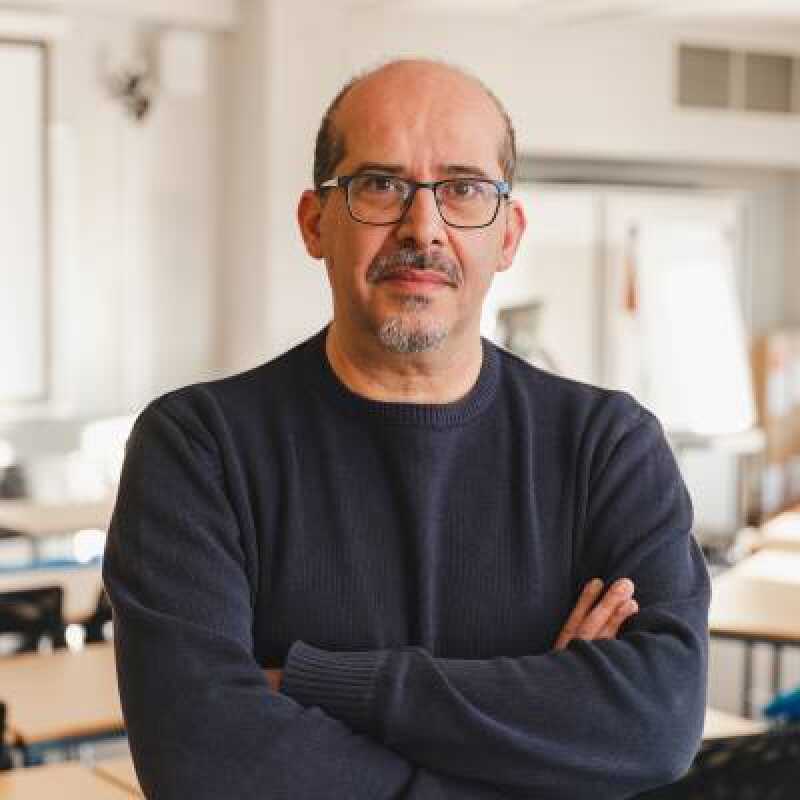- University of Kent
- Engineering at Kent
- People
- Christos Efstratiou
Christos Efstratiou


I am a Senior Lecturer in the School of Engineering and Digital Arts, University of Kent. Before joining Kent I was a Senior Research Associate at the University of Cambridge, a Research Associate at Lancaster University, and a Visiting Researcher at Sony Electronics Distributed Systems Lab. I received my PhD in Computer Science, from Lancaster University, UK. I hold an MSc (Distributed Systems) from Lancaster University and a BSc (Computer Engineering) from the University of Patras, Greece.
My main research interest lies in the general area of Ubiquitous Computing, with particular emphasis on the challenges of building multi-sensory computational systems to understand real-world human behaviour. My work involves the development of techniques to detect and model human activities using wearable or mobile sensing, IoT (Internet of Things) technologies, and passively captured human activity datasets.
My work has been funded by EPSRC, Innovate UK, EU Regional Development, the University of Kent, and a range of industrial partners. I have published more than 60 peer-reviewed papers, including papers that received the best-paper award at ACM Ubicomp 2014 and IEEE PerCom 2013. This body of work has so far generated more than 3,000 citations (h-index: 22).
I have served as member of technical program committees for a number of conferences, including IEEE PerCom, ACM Ubicomp, ACM MobiSys, ACM HotMobile. I was one of the co-founders and chair of the WristSense Workshop series and been a member of the organising committees of Ubicomp, MobiSys, HotMobile, PerCom.
I belong to the following research groups:
My main research interest lies in the general area of Ubiquitous Computing, with particular emphasis on the challenges of building multi-sensory computational systems to understand real-world human behaviour. My work focuses on the following topics:
Mobile and wearable technologies allow the capture of a range of sensing modalities that can reveal the activities of people. Data captured over long periods of time can allow the modelling of behavioural patterns and possible changes over time. In my work I have collaborated with healthcare specialists to apply such techniques for the monitoring of long term health conditions. For example, within the project “Epilepsy Networks” we explore the use of wearable wrist bands to detect the occurrence of seizures for people with epilepsy.
The patterns of social interaction between people has been shown to be related to quality of life, the efficient collaboration of teams, and as indicator for potential mental health problems. In this line of work I explore the use of wearable sensing technologies, and passive environmental sensing for the accurate detection of social interactions. Significant results in this area include the analysis of how teams of people interact within an organisation, and how the building architecture can influence social patterns (output received the best paper award at Ubicomp’14).
With the proliferation of IoT technologies, multiple devices can capture snapshots of people’s daily activities. In this line of work I am interested in the technical challenges of developing a flexible IoT infrastructures that can passively track human activities. In my work I investigate the opportunities of fusing mobile and wearable sensing with sensing embedded in the environment (output received the best paper award at PerCom’14). My broader aim is to investigate the infrastructure requirements needed to support novel machine learning techniques (deep learning) within resource constraint devices, and the challenges in sharing IoT infrastructures with multiple users.
Current Projects
Past Projects
Undergraduate modules:
Postgraduate modules:
I am looking for enthusiastic students who are interested in doing a PhD or Master by Research within the broader area of Ubiquitous computing. Please, feel free to email me your CV and a short description of your research interests.
Full Funding for PhD - starting 2019
Full scholarship available, covering home fees and a maintenance grant for a PhD, co-sponsored by EPSRC and MiiCare Ltd. Open for applications.
Deadline: Submit PhD application by February 8th 2019. Apply for an Electronic Engineering PhD online including your research proposal for this project.
Eligibility: Open to UK and EU applicants who have been resident in the UK for 3 years prior to commencement are eligible to apply.
Funding: Funding is available at the current home fee rate of £4,195.00 (rate for 2018/19) together with a maintenance grant of £14,777.00 (rate for 2018/19)
Topic: Passive activity sensing for assistive leaving
Current state-of-the-art in assistive living relies on a combination of wearable sensing technologies (i.e. wrist-bands) and location tracking technologies embedded in the living environment. However, real-world deployments of wearable technologies for the elderly have had only limited success. In this project we aim to explore a new paradigm where the daily activities of people are monitored passively through sensing technologies that are embedded within the environment, without the need for any form of wearable device or active user intervention. Specifically, the aim of this project is to rely on a combination of embedded sensing technologies involving audio sensing, RF sensing and presence (PIR) sensing that work collaboratively to accurately track the daily activities of elderly participants. The work focuses on activities that are of particular importance for the wellbeing of the target users (e.g. fall detection, deterioration of physical mobility, abnormal behavioural patterns).
Research challenges that would be investigated are:
Methodology: The project will involve the design, integration and deployment of prototype sensing infrastructure in lab conditions. This will enable the collection of data to train novel ML algorithms for passive sensing. Next, the developed system will be trialled in a real community deployment supported by the industrial partner miiCare Ltd. miiCare Ltd is currently involved in the deployment of assistive living technologies in Ebbsfleet Garden City.
Supervisor: Dr. Christos Efstratiou (C.Efstratiou@kent.ac.uk)
Co Supervisor: Prof. Ian McLoughlin (I.V.McLoughlin@kent.ac.uk)
The School of Engineering and Digital Arts has a number of scholarships for PhD students, administered under the Graduate Teaching Assistant Scheme. Please, check the School’s pages for details.
Loading publications...
Showing of total publications in the Kent Academic Repository. View all publications